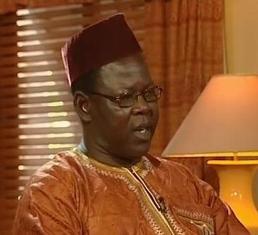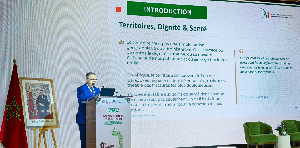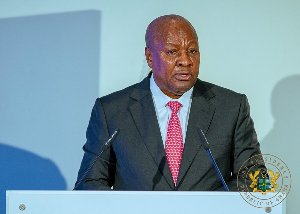The yet to be released Global Corruption Barometer for 2013 suggests that in Ghana, 54% of the 2000 respondents reported that corruption has increased in the past two years while only 20% reported that corruption has decreased.
Similarly, 64% of the respondents felt that corruption was a very serious problem while 18% felt it was a serious problem, bringing the total to 82% who felt that corruption is a problem. Only 6% felt corruption was not a problem while 12% were undecided.
The Global Corruption Barometer 2013 is a survey of the public’s perceptions and experiences of corruption in 107 countries covering 114,000 people in all.
In Ghana, a total number of 2000 people were surveyed, comprising respondents from two MMDAs in each of the ten administrative regions.
Find below the statement by the Ghana Integrity Initiative
GHANA INTEGRITY INITIATIVE
PRESS RELEASE ON THE TRANSPARENCY INTERNATIONAL GLOBAL CORRUPTION BAROMETER REPORT, 2013
1.0 Introduction
This morning, Transparency International will release its Global Corruption Barometer, 2013 simultaneously in all the countries covered by the survey and where it has country/local chapters. The GCB 2013 reveals that “More than one person in two thinks corruption has worsened in the last two years although survey participants also firmly believe that they can make a difference in the fight against corruption and have the will to take action against graft.
The Global Corruption Barometer 2013 is a survey of the public’s perceptions and experiences of corruption in 107 countries covering 114,000 people in all. In Ghana, a total number of 2000 people were surveyed, comprising respondents from two MMDAs in each of the ten administrative regions.
In general, the GCB 2013 shows that corruption is widespread with 27% of all respondents having paid a bribe when accessing public services and institutions in the last 12 months. According to Madam Huguette Labelle, the Chair of Transparency International, “Bribe paying levels remain very high worldwide, but people believe they have the power to stop corruption and the number of those willing to combat the abuse of power, secret dealings and bribery is significant”.
2.0 The Global Context
The key findings of the GCB 2013 globally are as follows:
1. Bribery is widespread;
2. Public institutions entrusted to protect people suffer the worst levels of bribery;
3. Governments are not thought to be doing enough to hold the corrupt to account;
4. The democratic pillars of societies are viewed as the most corrupt;
5. Personal connections are seen as corrupting the public administration;
6. Powerful groups are judged to be directing government policies and actions;
7. People state they are ready to change the status quo.
3.0 The Ghanaian Situation
In Ghana, 54% of the 2000 respondents reported that corruption increased in the past two years while only 20% reported that corruption had decreased. Similarly, 64% of the respondents felt that corruption was a very serious problem while 18% felt it was a serious problem, bringing the total to 82% who felt that corruption is a problem. Only 6% felt corruption was not a problem while 12% were undecided. In the respondents’ dealings with the public sector, 32% and 36% found personal contacts very important and important, respectively, showing a total of 68% of respondents finding personal contacts important, implying that if one does not have personal contacts one may not be able to access public services, a further implication of corruption. However, the good news is that only 8% of the respondents felt that government was run entirely by a few big entities, acting in their own interests, while 38% felt that, to a large extent, a few big entities run the government, bringing the total to 47%. Even then, this is still a significant figure.
Only 7% of the respondents felt that the government’s efforts at fighting corruption was very effective, while 23% felt that it was effective, bringing the total to only 30% of those having confidence in the government’s efforts in fighting corruption. 18% of the respondents felt the government’s efforts were very ineffective while 37% felt they were ineffective, bringing the total to 57% of the respondents saying that the government’s efforts were ineffective.
The respondents were asked to assess a number of public institutions as to how they view them in respect of corruption. As has been the case in the past, the Police topped the list (with 4.7 out of 5) as the most corrupt category of institutions, followed by political parties with a score of 4.2 out of 5. The details are shown n the table below, which also shows the situation in earlier years:

To substantiate this, the respondents were asked if they made contact with a number of the institutions and whether they had paid a bribe. In all, 54% of the respondents who made contact with various public service institutions reported having paid a bribe. For example, of the 38% of the respondents who made contact with the Police, 79% paid a bribe while of the 21% of the respondents who made contact with the Lands services such Lands Department, Land Valuation, Town and Country Planning and Land Title Registry, 52% paid a bribe. Also, 59% of the respondents made a contact with the education system and out of this 38% paid a bribe. Although only 16% of the respondents had contact with the judiciary, 57% of this number paid a bribe, giving cause to worry as corruption in the judiciary can send several innocent citizens to prison.
When the respondents were asked to state the reasons for which they had to pay a bribe, 30% of the respondents who paid a bribe did so because it was the only way to obtain the service they wanted while 45% paid a bribe because they wanted to speed up things. Only 18% of the respondents paid the bribe as a gift or a sign a gratuity while 8% of the respondents who paid a bribe did so in order to get a cheaper service.
However, it is heartening to note that 31% and 42% of all the respondents strongly agreed and agreed with the suggestion, respectively, that ordinary people can make a difference in the fight against corruption. While 81% of the respondents reported willing to sign a petition asking the government to do more in the fight against corruption, 79% of the respondents are willing to take part in a peaceful protest and/or demonstration. In addition, 83% of the respondents are willing to join an organization that works to reduce corruption while 82% of the respondents are willing to spread the word about the problem of corruption through social media
Moreover, 73% of the respondents are willing to report corruption to the various anti-corruption institutions such as “directly to the institution” concerned (35%), a general government hotline (30%), an independent non-profit institution such as GII (10%) and the Media (19%). Sadly, however, 40% of the respondents who would not report corruption said they would not do so because reporting would not make a difference. Even more worrying is the fact that 36% of the respondents who would not report corruption said that they would not report because they are afraid of the consequences while 20% did not know where to report acts of corruption.
4.0 Recommendations
Following from the findings of the GCB 2013, a number of key recommendations were made. GII fully endorses these recommendations and modifies them as follows:
a) The NDC administration headed by President John Mahama should institute effective anti-corruption measures to eliminate corruption within the Police Administration. This should give the Police Service a better public image and enable the citizens to have confidence in the Police Service and increase the effectiveness and efficiency of the Police Service to make it responsive to the needs of the citizens;
b) Even though the Judiciary is independent and largely impartial, there are still instances of perceived corruption that need to be dealt with seriously by the institution. The Chief Justice should, therefore, take measures to root out all corrupt officials within the Judicial Service, speed up law reforms, speed up the judiciary process with the view of reducing bureaucracy and ensuring that the official and unofficial cost of seeking justice is minimized as much as possible;
c) The various arms of government should work together to put in place adequate checks and balances to ensure that powerful and well-connected personalities and institutions within the private and public sectors do not hijack the political system and government policy and decision making and action to their advantage and to the disadvantage of the citizens;
d) The various institutions of government charged with dealing with corruption should be adequately resourced and given the necessary independence to fight corruption and bring corrupt persons to book. In line with this recommendation, the laws establishing them may have to be reviewed to make the organizations more relevant and effective.
e) Elected public officers should not enjoy immunity when charged with corrupt offences and the Judiciary and Parliament must urgently resolve the issue of how and when an MP can be arrested when he/she is alleged to have committed a crime; The time is long overdue for corrupt persons to be named, shamed and jailed and their illegally acquired properties confiscated to the state.
f) The Whistleblower Act should be amended to provide adequate protection for citizens to report wrongdoing in the public and private sector and protect them from retribution. There should be appropriate follow-up mechanisms to encourage people to use existing reporting mechanisms to speak out against corruption when they witness or experience it and get redress;
g) Ghanaians must begin to exercise their rights more responsibly by voicing out against corrupt officials, insisting on their rights and voting for candidates considered clean. Civil Society Organizations (CSOs) have a role to play in ensuring this and the National Commission for Civil Education (NCCE) should be resourced to enable it perform its constitutional mandate more effectively.
h) The Government and Parliament should work together to bring the Political Parties Act in line with the 1992 Constitution to ensure that political party financing is transparent and require political parties, candidates and donors to publicly disclose donations;
i) Government should enable independent civil society organizations to function as effective watchdogs of government and to help people to hold public officials to account.
j) The Assets Declaration Law should be enforced to the letter while reforms are implemented to make it more relevant.
k) The Executive and Parliament should adopt a comprehensive Code of Conduct for its members, including guidance on conflict of interest situations and rules of disclosure of assets, interests and income, using inputs from the Ghanaian public, particularly the CHRAJ.
6.0 Conclusion
Politicians and public officers who live at the comfort of the taxes of the citizens should lead by example by publishing asset declarations for themselves and their immediate family. Last Friday marked exactly six months of office of the President, the Vice President, the Speaker and Deputy Speakers of Parliament and other Members of Parliament, who should have all declared their assets and liabilities by that date. Ghanaians do not know who has declared and who has not and the Auditor General has not been proactive enough to publish the names of the public officers who have declared their assets and liabilities as required by law.
The Executive, the members of the Legislature, political parties and individual candidates should lead by example by disclosing where they get their money from, make clear who funds them and reveal potential conflicts of interest. They must also disclose how they spend the money they raise not only to meet Ghana’s constitutional requirements but also to secure the confidence of their membership, especially those who contribute to those parties’ finances.
The time is now for all Ghanaians to say NO TO CORRUPTION
Thank you,
Vitus Adaboo Azeem Executive Director
Accra, 9 July 2013
General News of Tuesday, 9 July 2013
Source: joyonline
Corruption Barometer: 54% says corruption has increased in Ghana













